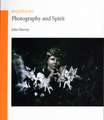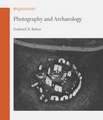Photography and Tibet: Exposures
Autor Clare Harrisen Limba Engleză Paperback – 14 oct 2016
Magnificent and mysterious, Tibet has been a source of fascination for outsiders for centuries, and its grand landscapes and vibrant culture have especially captivated photographers. But the country is both geographically and politically challenging, and access from the outside has never been easy. With this book, Clare Harris offers the first historical survey of photography in Tibet and the Himalayas, telling the intriguing stories of both Tibetans and foreigners who have attempted to document the region’s wonders on film.
Harris combines extensive research in museums and archives with her own fieldwork in Tibetan communities to present materials that have never been examined before—including the earliest known photograph taken in Tibet, dating to 1863. She looks at the experimental camera-work of Tibetan monks—including the thirteenth Dalai Lama—and the creations of contemporary Tibetan photographers and artists. With every image she explores the complex religious, political, and cultural climate in which it was produced. Stunningly illustrated, this book will appeal to anyone interested in the dramatic history of Tibet since the mid-nineteenth century and its unique entanglements with aesthetics and modernity.
Harris combines extensive research in museums and archives with her own fieldwork in Tibetan communities to present materials that have never been examined before—including the earliest known photograph taken in Tibet, dating to 1863. She looks at the experimental camera-work of Tibetan monks—including the thirteenth Dalai Lama—and the creations of contemporary Tibetan photographers and artists. With every image she explores the complex religious, political, and cultural climate in which it was produced. Stunningly illustrated, this book will appeal to anyone interested in the dramatic history of Tibet since the mid-nineteenth century and its unique entanglements with aesthetics and modernity.
Preț: 144.78 lei
Preț vechi: 176.30 lei
-18% Nou
Puncte Express: 217
Preț estimativ în valută:
27.71€ • 30.09$ • 23.27£
27.71€ • 30.09$ • 23.27£
Carte disponibilă
Livrare economică 01-08 aprilie
Livrare express 15-21 martie pentru 65.91 lei
Preluare comenzi: 021 569.72.76
Specificații
ISBN-13: 9781780236520
ISBN-10: 1780236522
Pagini: 224
Ilustrații: 60 color plates, 50 halftones
Dimensiuni: 191 x 220 x 18 mm
Greutate: 0.64 kg
Editura: REAKTION BOOKS
Colecția Reaktion Books
Seria Exposures
ISBN-10: 1780236522
Pagini: 224
Ilustrații: 60 color plates, 50 halftones
Dimensiuni: 191 x 220 x 18 mm
Greutate: 0.64 kg
Editura: REAKTION BOOKS
Colecția Reaktion Books
Seria Exposures
Notă biografică
Clare Harris is professor of visual anthropology in the School of Anthropology and Museum Ethnography at the University of Oxford, curator for Asian collections at the Pitt Rivers Museum, and a fellow of Magdalen College, Oxford. She is the author of several books, including In the Image of Tibet, also published by Reaktion Books.
Cuprins
Note on Language
Prologue
One: Picturing Tibet from the Periphery
Two: The Opening of Tibet to Photography
Three: Tibetan Encounters with the Camera
Epilogue
References
Select Bibliography
Acknowledgements
Photo Acknowledgements
Index
Prologue
One: Picturing Tibet from the Periphery
Two: The Opening of Tibet to Photography
Three: Tibetan Encounters with the Camera
Epilogue
References
Select Bibliography
Acknowledgements
Photo Acknowledgements
Index
Recenzii
“Harris’s wonderful Photography and Tibet is part of the Reaktion Books Exposures series, which provides introductions to the history of photography related to specific themes and regions. Photography and Tibet accomplishes this in providing a much-needed introduction to the history of photography in Tibet and surrounding regions of the Himalayas. However, Harris gives us much more, as along with this historical overview, she reveals how the history of photography in Tibet can also be seen as the history of the way Tibet has been imagined beyond its borders by Westerners, Chinese, and others, and how this imagining has directly influenced colonial engagement with Inner Asia and the Himalayas.”
“The narrative is lively and engaging with excellent reference notes, bit it is the many and varied photographs that are the main focus. As the author wryly observes, these often say more about the photographers themselves than they do about their subjects. . . . This is a highly absorbing and important book. It should appeal to the general reader but particularly to those with an interest in Tibetan history and the role of photography as a promoter of truth and artistic ability.”
“Photography and Tibet brings to the fore a selection of remarkable work presented in an accessible and engaging way. This is an inspiring book from which students and researchers alike will derive great benefit, and one which also has wider resonance for historical geographers working with visual archives in very different contexts.”
"Written in a lively and concise style, the book makes sense of an impressive array of material. . . . This tour de force is deliberately intended for the general reader interested in an up-to-date introduction to the history of the representation and reception of Tibet through photographs taken by both Westerners and Tibetans. The book will nonetheless be of benefit to the scholarly community, since it presents so-far unresearched archive material, raises important issues of colonial history and Western material and visual cultures that the case of Tibet highlights particularly well, and provides reciprocally unprecedented developments on the assimilation of the technology of photography by Tibetans up to this day."
"Photography and Tibet is a richly informative and a hugely entertaining read. . . . The bottom line—for anyone with a passion for photography or Tibet, ideally both, this is an absolute must-have book."
“This expansive, intricate, and virtuosic account offers a radical rethinking of photography's relationship with Tibet. Rejecting orientalist narratives of that relationship, Harris addresses the entangled political and cultural dynamics of the medium, from the colonial period to the twenty-first century, through which Tibetan culture has been understood and understands itself.”
“A wonderful survey-cum-detective story about the multiple locations of Tibet, and the role of the camera in making them visible. We come to understand the heavy burden of representation in this context, and the remarkable tenacity of ‘aura’ when the photograph attempts to suture the wounds of exile. This a compelling and authoritative account, filled with important new materials and vivid connections, that takes us to the heart of practices caught in the crossfire of different visions of Tibet.”








